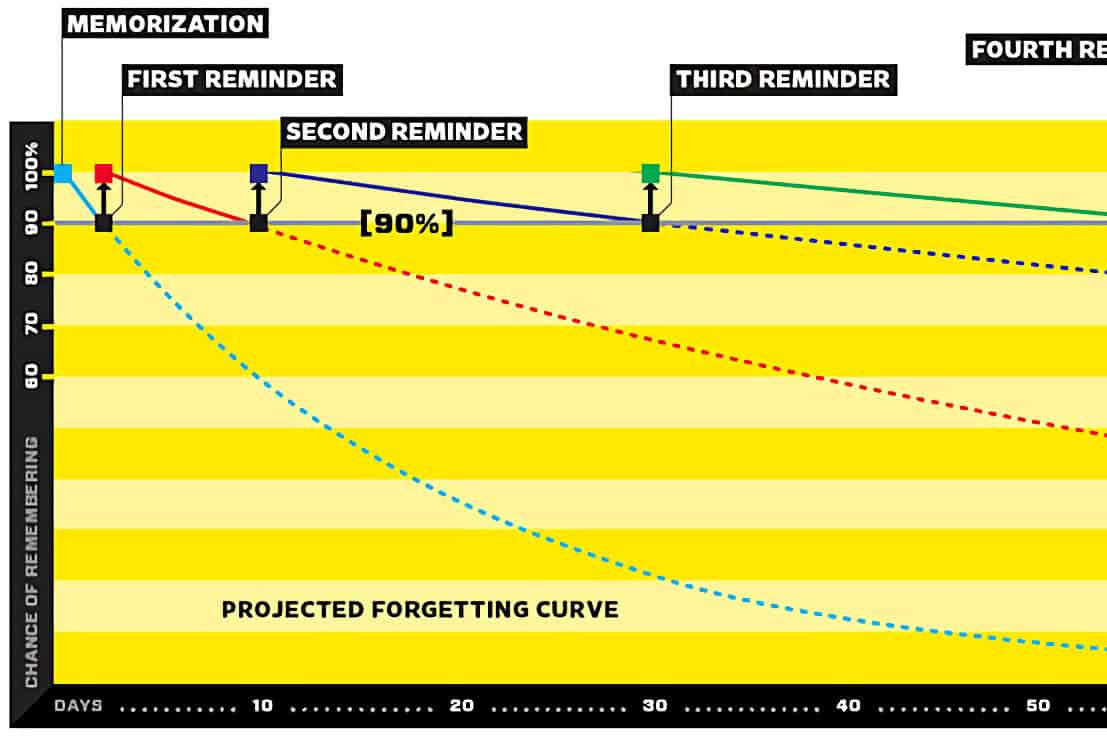There is a saying by Zig Ziglar “Repetition is the mother of learning, the father of action, which makes it the architect of accomplishment”. Repetition is definitely an important factor in learning. But have you ever heard about a method called Spaced Repetition Method, which can help you recall 92% of everything you learned and make forgetting become difficult? Let’s take a look to find out what it is and how it works.
What is Spaced Repetition method
Short term memory is easy to develop by repeating over and over something, and you can remember it perfectly for a while, maximum for a couple of days. When it comes to long term memory, a research carried by Hermann Ebbinghaus, a German researcher in the late 19th century, showed that over 90% of the information disappears within a few days, and created a “forgetting curve” as below

The basic concept is that memories begin to fade shortly after they’re formed, and disappear unless we are exposed to the information again. Therefore, Ebbinghaus suggested if we recall the information frequently, but not too frequently, the information tends to stay longer in our brain. That is the Spaced Repetition concept.
How Spaced Repetition works
Francis Bacon, an English philosopher described in the Novum Organum in 1620 that “If you read a piece of text through twenty times, you will not learn it by heart so easily as if you read it ten times while attempting to recite from time to time and consulting the text when your memory fails.” The image below shows how Spaced Repetition actually works.

In other words, Spaced Repetition is a technique that incorporates increasing intervals of time between subsequent review of previous information in order to utilise the spacing effect as Ebbinghaus observed a hundred years ago, “with any considerable number of repetitions a suitable distribution of them over a space of time is decidedly more advantageous than the massing of them at a single time.” And the best time to try to remember something is when it’s on the verge of being forgotten, which then strengthens the neural pathways associated with the information and preserve it for a longer period of time.
How to apply Spaced Repetition in English learning
The principle of Spaced Repetition is useful in many contexts but seems to work best for the memorisation of simple facts and lists. The vocabulary acquisition in second language learning is perfect for this method application since a learner must acquire a large number of word-lists and retain them in memory as long as possible.
Using flashcards to learn vocabulary is a good way to apply Spaced Repetition method. Flashcards must be designed to trigger active recall, rather than simple recognition such as a clear question/ answer format. Moreover, this method only improves recall once you have already learnt something. Therefore, you have to learn the vocabulary first so that Spaced Repetition can help you retain it.
You can also use computer programs which apply Spaced Repetition technique such as Mnemosyne and Anki, or other applications to make utilising of this method. Since we tend to review information that we find easiest or most interesting, and also have trouble to keep our flashcard in sequence, these program are designed to space the cards appropriately and help learners stay disciplined so that we focus on our weakness not our interests. eJOY ENGLISH is an app for portable devices you can try. It was also designed based on the principle of Spaced Repetition Method in order to help you improve your vocabulary through interactive games.
In conclusion, Spaced Repetition Method is a learning technique which was first developed hundred years ago. It was based on trustful scientific evidences of how the brain works and empowers us with the possibility to work smart, not hard, to gain more in less time.



















